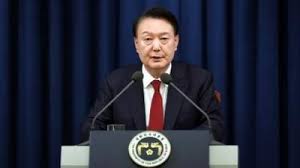
South Korean authorities conducted a dramatic raid on the presidential office on Wednesday as part of an investigation into President Yoon Suk Yeol’s imposition of martial law. The move comes amid escalating political turmoil and allegations of insurrection against the President.
Police Actions and Raids
The Special Investigation Team, tasked with probing the martial law declaration, carried out raids on several key locations, including the presidential office, the National Police Agency, the Seoul Metropolitan Police Agency, and the National Assembly Security Service. This development was confirmed in a message sent to AFP.
The investigation has already led to the detention of South Korea’s top two police officers—National Police Agency Commissioner General Cho Ji Ho and Kim Bong-sik, the head of Seoul’s metropolitan police agency. Both are being held at Seoul’s Namdaemun police station for questioning over their roles in enforcing the martial law decree.
Political Fallout and Impeachment Efforts
The controversy has triggered widespread political unrest, with the opposition Democratic Party announcing plans to submit a fresh impeachment motion against President Yoon on Saturday. A previous attempt to impeach him failed after the ruling party boycotted the vote.
Despite uncertainty over Yoon’s presidency, opposition leaders are determined to push for a new vote. Critics argue the crisis has led to political paralysis, disrupted foreign policy, and rattled financial markets, raising doubts about Yoon’s ability to continue his term.
The leader of Yoon’s conservative party has hinted at a possible early transition of power, suggesting a shift toward early elections. However, critics have labeled this move unconstitutional, emphasizing that the Constitution mandates impeachment as the only legitimate way to suspend presidential powers.
Defense Ministry and Presidential Authority
The Defense Ministry has reaffirmed that President Yoon remains in command of South Korea’s armed forces, countering claims that his authority has been sidelined. Legal experts argue that even amid impeachment proceedings, the president retains control over the military unless officially removed from office.
Growing Uncertainty
The martial law declaration, which lasted briefly, has sparked intense debate about its necessity and legality. Critics allege it was an overreach of presidential power, while supporters defend it as a necessary step to ensure national security.
As South Korea grapples with this political crisis, the nation faces increasing uncertainty over its leadership and stability. The next steps in the impeachment process and the outcome of ongoing investigations are expected to have profound implications for South Korea’s political and social landscape.
Sources By Agencies


